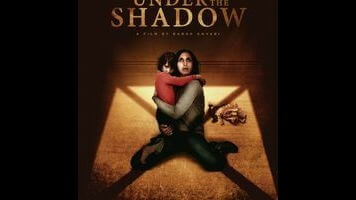To that hoary old question of who’s the real monster, Under The Shadow supplies a new answer: the cultural enforcers of 1980s Iran. Set during the country’s war with Iraq, when air sirens announced death from above, this debut feature from writer-director Babak Anvari is a Middle Eastern Babadook, with a blatant social subtext instead of a psychological one. If it’s neither as frightening nor as emotionally intense as that new horror classic, there’s still something exciting about seeing familiar tropes placed in an unfamiliar context—in this case, a nation ravaged by violent conflict and stifled by fundamentalist law.
For a while, we could be watching a straight domestic drama, the setup to one of Asghar Farhadi’s tales of fracturing family. Accused of subversion for her involvement in the Cultural Revolution of the late ’70s (“Everyone was political then,” she fruitlessly pleads), twentysomething Shideh (Narges Rashidi) is flatly forbidden from returning to medical school—a decision that kills her dreams of becoming a doctor. Her husband (Bobby Naderi) is already a practicing physician, and in order to keep his license, he agrees to provide emergency services on the front lines, leaving the depressed Shideh alone to watch their daughter, Dorsa (Avin Manshadi). Things are uneasy in their small apartment long before a dud missile drops out of the sky, piercing their sanctuary like the defused bomb of Guillermo Del Toro’s The Devil Backbone and—once removed—creating an ominous crack in the ceiling, through which malevolent djinn (or wind spirits) apparently emerge. Or do they?
Most of Under The Shadow takes place within the cramped confines of this one apartment, and as in The Babadook, tension derives less from paranormal sources than the slowly fraying nerves of a (more or less) single parent, as well as the strong performance of the actress playing her. Rashidi, who’s basically unknown in the States, provides Shideh the silent-scream resentment of a woman born in the wrong place and time, boxed in from all sides—by a society that sees her only as a wife and mother, by a husband that sees her as a failure in those same roles. (She seems to channel her frustration into relentless cardio exercise—a small act of defiance, given that she gets her workouts from a Jane Fonda tape, played on a forbidden VCR.) The monsters themselves are quite obviously metaphoric, and Anvari hammers home that idea by giving the chief specter the amorphous shape of a giant, fluttering burka. Coming from a filmmaker who grew up in Tehran, before relocating to London as a teenager, this choice feels especially pointed: The threat isn’t just to the life of a mother, but to the future of her child, who might be swallowed whole by the repressive mores of her culture—the alternative “parent” hoping to raise her.
Just don’t expect bone-deep terror. The slow-burn pacing means that half the film’s slim running time has elapsed before the evil imps arrive, and the scares thereafter are very much of the peekaboo variety, figures appearing suddenly in doorways or blowing past peepholes at near-subliminal speed. (The creature effects, too, are a little primitive, though in a more charming than detrimental way.) No, it’s not an instant nightmare-generator, but Under The Shadow still demonstrates how two movies you’ve seen many times before—an Iranian social-issues drama and a Blumhouse-style poltergeist thriller—can be combined to create one you haven’t. Besides, the setting itself supplies its own, very different kind of horror, provoked by the constant threat of dropping bombs and the disdain of authorities who insist that “a woman should be afraid of exposing herself above all else.” By the end, as Shideh’s neighbors have all fled the city, Tehran itself has begun to look like an oversized haunted house. Escaping its ghosts would require a hell of a lot more than a sprint for the exit.

 Keep scrolling for more great stories.
Keep scrolling for more great stories.
